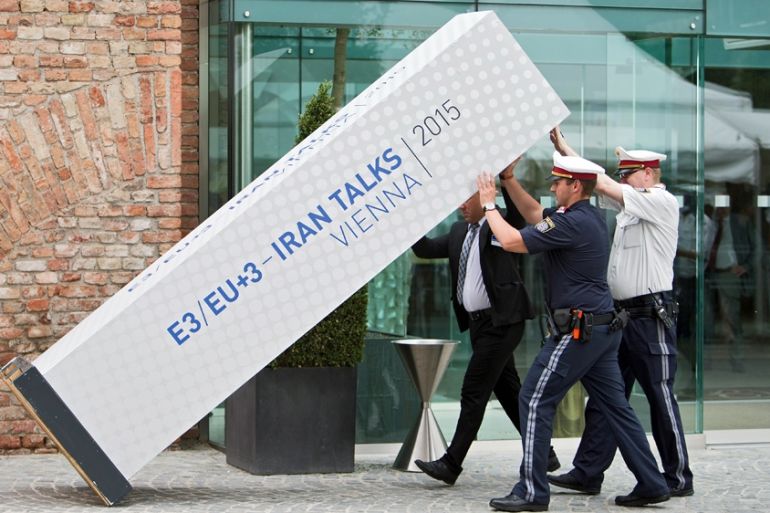Missile and arms embargo dispute holding up Iran deal
Western officials against Iranian demands to include the lifting of ballistic missile sanctions as part of nuclear deal.

A dispute over UN sanctions on Iran’s ballistic missile programme, as well as a broader arms embargo, are said to be among the main issues holding up a nuclear deal between Tehran and six world powers, a day before their latest self-imposed deadline.
“The Iranians want the ballistic missile sanctions lifted. They say there is no reason to connect it with the nuclear issue, a view that is difficult to accept,” one Western official told the Reuters news agency on Monday. “There’s no appetite for that on our part.”
Iranian and other Western officials confirmed the view as the foreign ministers of the six powers – Britain, China, France, Germany, Russia and the US – gathered in Vienna to try to strike a deal with Iran by Tuesday night.
“The Western side insists that not only should it [ballistic missiles] remain under sanctions, but that Iran should suspend its programme as well,” an Iranian official said.
“But Iran is insisting on its rights and says all the sanctions, including on the ballistic missiles, should be lifted when the UN sanctions are lifted.”
Separately, a senior Iranian official speaking on condition of anonymity told reporters in the Austrian capital that Tehran wanted a UN arms embargo terminated as well.
The West wants to keep the arms embargo in place and a senior Western diplomat said a removal was “out of the question”.
Al Jazeera’s James Bays, reporting from Vienna, said while there has been much progress in the talks, “gaps” still remain, which need “political decisions” among the countries involved.
“We are told by all sides that there are only a few remaining sticking points on the table,” he said.
Foreign ministers from the six powers and Iranian Foreign Minister Mohammad Javad Zarif were continuing to holds talks inside the Palais Coburg, the hotel hosting the summit, on Monday.
Curbing nuclear programme
The deal under discussion is aimed at curbing Tehran’s most sensitive nuclear work for a decade or more, in exchange for relief from sanctions that have slashed its oil exports and crippled its economy.
The US and its allies fear Iran is using its civilian nuclear programme as a cover to develop a nuclear weapons capability. Iran denies the accusation and says its programme is peaceful.
An agreement would be the most important milestone in decades towards alleviating hostility between the US and Iran, enemies since Iranian revolutionaries captured 52 hostages in the US embassy in Tehran in 1979.
It could also reduce the odds of any military strike against Iran’s nuclear facilities, something Washington has refused to rule out, and the possibility of a wider war in the Middle East, where conflicts already rage in Iraq, Syria and Yemen.
Zarif told reporters on Monday that “some differences remain and we are trying and working hard”.
If there is a nuclear deal, it will include a draft UN Security Council resolution that, once adopted, would terminate all UN nuclear-related sanctions, while simultaneously reimposing other existing restrictions on Iran.
The six powers argue that removing those measures could further destabilise the region.
An Iranian official told the semi-official Tasnim news agency that the talks could continue until July 9, echoing remarks by some Western diplomats.
Kerry said negotiators were still aiming for July 7, the date they set when they missed a June 30 deadline.
Obama must submit the deal to the US Congress by July 9 in order to get an accelerated 30-day review.
If it is submitted later, the Republican-led Congress would have 60 days to review it, bringing more opportunities for the deal to unravel.